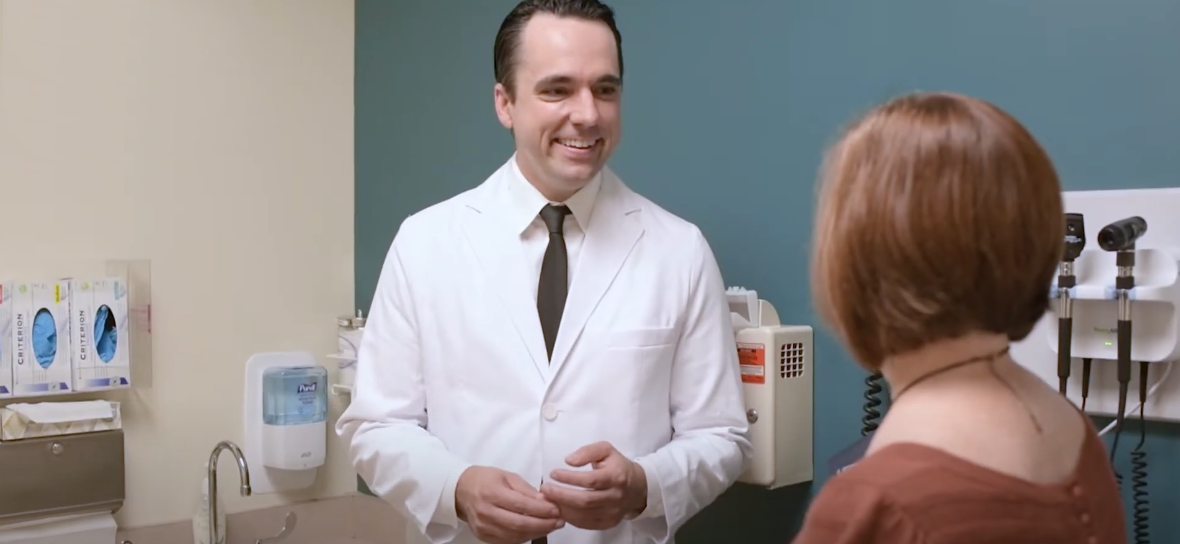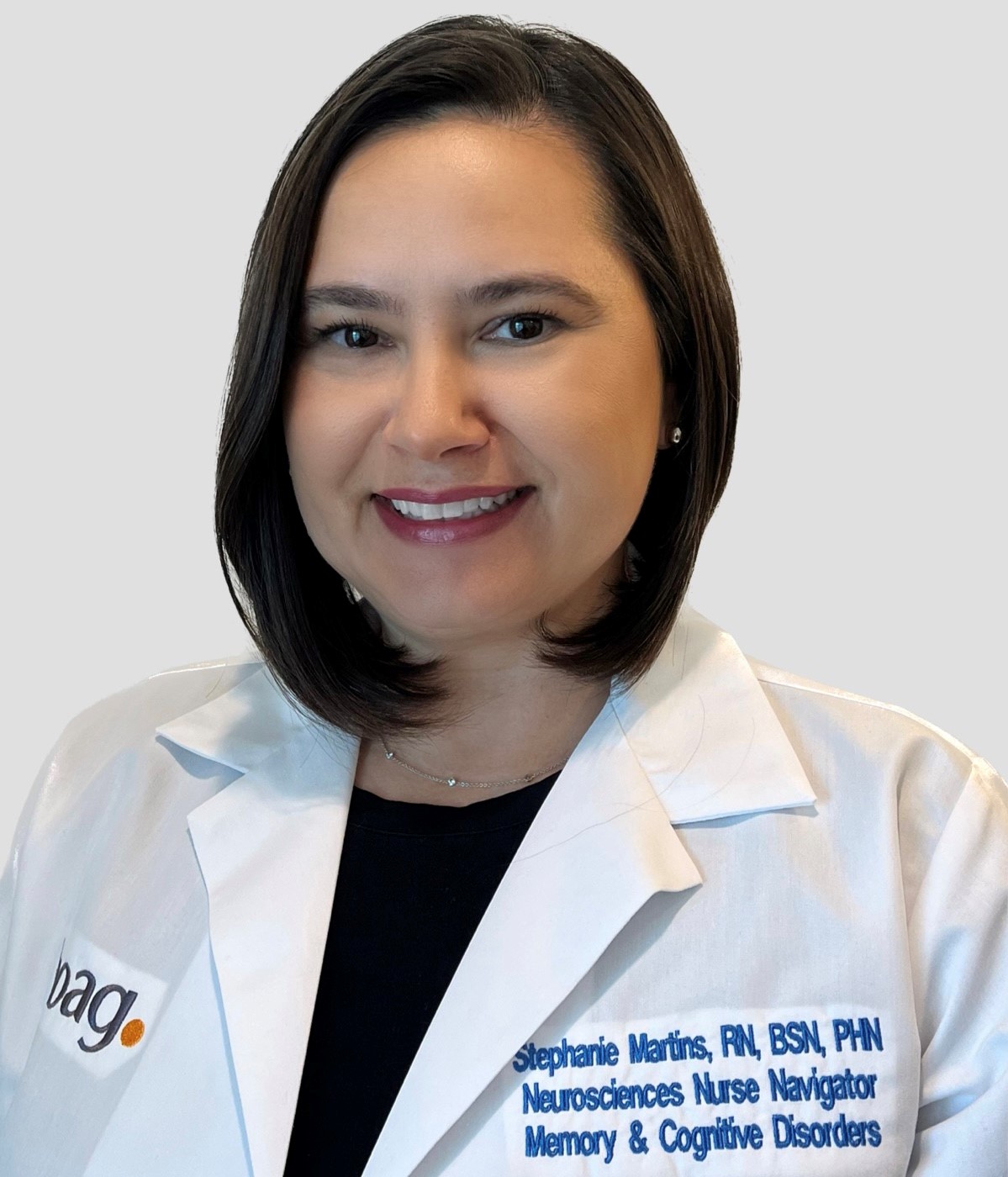Memory & Cognitive Disorders Program
At Hoag’s Memory & Cognitive Disorders Program, we provide compassionate, evidence-based care for patients and families navigating conditions that affect memory, thinking, and cognitive function. Our program combines advanced diagnostic tools, expert clinical care, and supportive resources to help individuals maintain independence and quality of life for as long as possible.
520 Superior Ave, Suite 200, Newport Beach, CA 92663
(949) 557-0330
- About
- Conditions Treated
- Treatments
- Education & Resources
- Brain Health Outreach Program
- FAQs
- Meet the Team
Cognitive loss affects 1 in 8 people over 65—the fastest-growing age group. Hoag's Memory & Cognitive Disorders Program supports brain health through prevention, early detection, accurate diagnosis, and treatment, including access to clinical trials.
Why Choose Hoag Memory & Cognitive Care?
Hoag is nationally recognized for excellence in neurology and neurosurgery, consistently ranked among the top programs in the United States. Our dedicated specialists—including neurologists, neuropsychologists, nurse practitioners, social workers, and rehabilitation experts—work together to provide individualized care for each patient.
We treat a wide range of conditions, from mild cognitive changes to complex forms of dementia, always focusing on what matters most: supporting patients and their loved ones through every step of their journey.
Quick support
Alzheimer's Disease
Alzheimer’s disease is the most common cause of dementia, affecting memory, thinking, and daily function over time. While there is no cure, early diagnosis and treatment can help slow progression, manage symptoms, and support both patients and families.
Brain Health Outreach Program
Dedicated to raising awareness about dementia and brain health across Orange County. The program educates the public, healthcare professionals, and hospitals, while hosting monthly events at senior centers and community locations.
Cognitive Severity Stages
Curious about how memory and thinking changes over time? Learn more about the stages of cognitive decline, from mild forgetfulness to more advanced dementia, and what each stage may mean for you or a loved one.

Hoag Memory & Cognitive Disorders Program
Our Memory and Cognitive Disorders Program continues to focus on three main goals:
Provide community outreach and education on the Center for Brain Health to promote awareness of dementia related issues
Delivering an accurate diagnostic assessment and monitoring of mild cognitive impairment, Alzheimer’s Disease and related disorders.
Offering a comprehensive treatment approach, including access to clinical research and trials.

Meet Dr. Ritter

Visit Our Team in Newport Beach
Hoag Health Center - Newport Beach Memory & Cognitive Program
- 520 Superior Ave, Suite 200, Newport Beach, CA 92663
- (949) 557-0330
Your memory care starts here
1
Find the right provider
Get care from medical providers that fit your needs in a location near you.
Find a provider2
Explore memory resources
Find information made to guide and support you on your journey.
See all resources3
Get in touch
Didn’t see what you’re looking for? Reach out and we’ll make sure you get what you need.
Contact usCauses of Cognitive Impairment
Cognitive impairment can arise from virtually any poorly controlled chronic disease of the brain or the body’s organs, including hypertension, high cholesterol, heart disease, stroke, peripheral vascular disease, hypothyroidism, diabetes, chronic obstructive lung disease, kidney disease, infections, severe pain syndromes, obesity, sleep apnea, depression, anxiety, bipolar disorder, obsessive compulsive disorder, attention deficit disorder, multiple sclerosis, epilepsy, and alcohol, sedative, opiate or other chemical dependency. Single or repeated head injuries can impair cognition. Certain medications that get into the brain can impair cognition, such as tranquilizers, anticonvulsants, antipsychotics, older antidepressants, pain medications, and older bladder incontinence medications. Most of these conditions are treatable, particularly when memory cognitive disorders are detected early through annual monitoring of cognition after age 50 years old.
The degenerative brain disorders account for less than 50% of all people with memory and cognitive disorders in primary care medical settings. These include Alzheimer’s Disease (AD), Parkinson’s Disease, Lewy Body Disease, Frontal Temporal Lobe Disease, and prion disease.
In recent years, infusion therapies have emerged as a promising avenue for managing certain forms of dementia, particularly Alzheimer’s Disease. These treatments often involve the intravenous administration of monoclonal antibodies that target amyloid-beta plaques—abnormal protein deposits commonly found in the brains of Alzheimer’s patients. Medications such as lecanemab and donanemab have shown potential in slowing disease progression when administered during the early stages of cognitive decline. In addition to anti-amyloid therapies, infusion treatments may also include vitamins, nutrients, or other compounds aimed at improving metabolic or neuroinflammatory processes involved in cognitive decline. While not a cure, these infusion-based approaches represent an important step forward in the therapeutic landscape, offering hope for improved quality of life and extended cognitive function in individuals diagnosed with degenerative brain disorders.
Common Memory Conditions
Alzheimer's disease is a progressive neurological disorder that affects the brain, leading to memory loss, confusion, and changes in behavior. It is the most common cause of dementia, a general term for a decline in cognitive abilities severe enough to interfere with daily life.
In Alzheimer's disease, abnormal protein deposits, such as amyloid plaques and tau tangles, build up in the brain, disrupting the communication between nerve cells and ultimately causing their death. This leads to a gradual decline in cognitive functions, including memory, reasoning, and language skills.
The early symptoms often include forgetfulness, difficulty remembering recent events, or repeating questions. As the disease progresses, it can cause more severe symptoms like disorientation, difficulty recognizing loved ones, changes in mood or behavior, and loss of the ability to perform everyday tasks.
Although the exact cause of Alzheimer's isn't fully understood, genetic, environmental, and lifestyle factors are believed to contribute to its development. Currently, there is no cure, but treatments can help manage symptoms or slow the progression of the disease.
Frontotemporal dementia (FTD) is a group of brain disorders caused by the progressive degeneration of the frontal and temporal lobes of the brain. These areas of the brain are associated with important functions such as personality, behavior, decision-making, and language. FTD typically affects people at a younger age than other forms of dementia, often beginning in the 50s or 60s.
There are two main types of FTD, behavioral variant FTD (bvFTD) and primary progressive aphasia (PPA).
As the disease progresses, people with FTD may experience changes in motor skills, such as difficulty walking or controlling movements, especially in certain forms of FTD that overlap with motor neuron diseases like ALS (amyotrophic lateral sclerosis).
Lewy body dementia (LBD) is a type of progressive neurological condition that affects the brain. It is caused by the abnormal buildup of proteins called alpha-synuclein that form structures known as Lewy bodies within brain cells. These Lewy bodies disrupt the normal functioning of the brain, leading to a range of symptoms that can vary from person to person.
There are two main types of LBD:
- Dementia with Lewy bodies (DLB)
- – This form primarily affects cognitive function, such as memory, thinking, and reasoning. People with DLB may also experience hallucinations, fluctuations in alertness, and motor symptoms similar to Parkinson's disease.
- Parkinson's disease dementia (PDD)
- – This form typically develops in people who have been diagnosed with Parkinson's disease, with cognitive changes occurring later on in the disease.
Vascular dementia is a type of cognitive decline caused by reduced blood flow to the brain, often due to strokes or other blood vessel problems. When the brain's blood supply is disrupted, it can lead to brain cell damage, affecting memory, thinking, and behavior.
There are two main types of vascular dementia:
- Multi-infarct dementia
- This is the most common form, where small strokes (or "infarcts") occur in various parts of the brain, leading to gradual cognitive decline.
- Subcortical vascular dementia
- This form is typically linked to the narrowing of small blood vessels in the brain, affecting areas responsible for memory and executive functions like planning and decision-making.
MCI is also identified as the first clinical stage of Alzheimer’s disease (AD). The subtype of MCI associated with AD is called amnestic MCI and affects an individual’s memory. Approximately 80% of people with amnestic MCI develop AD within 6 years. According to the Mayo Clinic, 15-20% of MCI patients progress to dementia each year. In comparison, the progression rate for the general population is 1-2%. Since MCI is the first symptomatic stage of AD, accurately detecting MCI enables medical professionals to then take the steps necessary to determine if a patient has early stage AD and might benefit from timely intervention.
Symptoms of Mild Cognitive Impairment (MCI)
Your brain changes as you grow older just like the rest of your body. Many people notice gradually increasing forgetfulness as they age. It may take longer to think of a word or to recall a person’s name.
But consistent or increasing concern about your mental performance may suggest MCI. Cognitive issues may go beyond what’s expected and indicate possible MCI if you experience any or all of the following:
- You forget things more often.
- You forget important events such as appointments or social engagements.
- You lose your train of thought or the thread of conversations, books or movies.
- You feel increasingly overwhelmed by making decisions, planning steps to accomplish a task or interpreting instructions.
- You start to have trouble finding your way around familiar environments.
- You become more impulsive or show increasingly poor judgment.
- Your family and friends notice any of these changes.
- If you have MCI, you may also experience:
- Depression
- Irritability and aggression
- Anxiety
- Apathy
Individuals in the dementia stage have declined in ability to perform instrumental activities of daily living, which include well learned skills such as cooking, shopping for groceries, driving to familiar locations, paying bills, doing housework or home repairs, performing well learned hobbies or pastimes.
The dementia stage progresses to affect even more well learned skills, called basic activities of daily living, including bathing, dressing, operating a toilet, planning to urinate or defecate so that they get to the toilet on time. Dementia finally progresses to affect walking speech, swallowing and control of the trunk, neck and face. The dementia stage is not seen in normal aging individuals and is due to one or more cognitive disorders. In Alzheimer’s Disease, the dementia stage lasts an average of 7 years.
Examples of cognitive impairment often seen during the dementia stage are:
- Rapid forgetting of recent instructions, conversations, or events
- Difficulty recognizing or naming common objects, familiar persons, or places
- Difficulty communicating in one’s usual capacity
- Difficulty making decisions or judgments such as the proper clothing to wear
- Difficulty organizing, planning and executing tasks such as packing or planning a vacation
- Difficulty operating familiar instruments such as a remote control, telephone, or computer
Dementia Treatment Options | Medications, Infusions & Lifestyle Care
While there is currently no cure for dementia, today’s treatments can help slow progression, manage symptoms, and improve quality of life. At Hoag’s Memory & Cognitive Disorders program, our team provides comprehensive, personalized care for Alzheimer’s disease, Lewy body dementia, frontotemporal dementia, and other memory disorders.
We combine FDA-approved medications, infusion therapies, and lifestyle approaches to give patients the best chance at maintaining independence and living well.
Medications for Dementia
Several medications are available that may help manage memory loss, confusion, and behavioral changes associated with dementia:
Cholinesterase inhibitors (donepezil, rivastigmine, galantamine): These medications can help improve communication between nerve cells in the brain and may lessen symptoms of memory loss and confusion.
NMDA receptor antagonist (memantine): Often prescribed for moderate-to-severe dementia, memantine can help with attention, language, and the ability to perform daily activities.
Combination therapy: In some cases, patients may benefit from a combination of cholinesterase inhibitors and memantine.
Medications for behavioral symptoms: Anxiety, depression, and sleep issues may be managed with targeted medications prescribed by a neurologist or psychiatrist.
Consulting with your memory specialist will provide information on what medication treatments are appropriate for your individual condition and diagnosis. Hoag approaches treatment on an individual level to best understand how your symptoms are presenting and which medication may help to ease those symptoms.
Infusion Therapies
Recent advances have introduced disease-modifying therapies delivered through intravenous (IV) infusions. These treatments target the underlying biology of conditions like Alzheimer’s disease.
Anti-amyloid antibody infusions: Designed to reduce the buildup of amyloid plaques in the brain, which are linked to cognitive decline in Alzheimer’s disease.
Ongoing clinical trials: Hoag offers access to investigational treatments through clinical research studies, giving eligible patients opportunities to try therapies not widely available elsewhere.
Employing the integrative, patient-first care model that characterizes Hoag's Memory and Cognitive Disorders program, our program is currently infusing more than 50 patients, making it among the largest antibody programs in the country and one of the only ones where patients receive diagnosis, treatment, and monitoring within one integrated health system.
Lifestyle Approaches & Supportive Therapies
Lifestyle changes and supportive care play a crucial role in helping patients and families manage dementia:
Physical activity: Regular exercise supports cardiovascular health, mobility, and brain function.
Cognitive stimulation: Memory exercises, reading, and problem-solving activities may help preserve function.
Dietary support: Heart-healthy diets, such as the Mediterranean or MIND diet, are linked to better brain health.
Occupational, physical, and speech therapy: These therapies help patients maintain independence, manage daily challenges, and improve communication skills.
Mental health and counseling: Access to neuropsychiatry and support groups provides emotional care for both patients and caregivers.
Care coordination: Nurse navigators, social workers, and case managers at Hoag guide families through resources, care planning, and supportive services.
For more information on lifestyle approaches for a healthy brain, see our Five Habits for Brain Health.
Accurate diagnosis and tailored treatment make a significant difference. Our neurologists, neuropsychologists, and memory disorder specialists work closely with families to ensure each care plan addresses both medical needs and quality of life.
Easy Lifestyle Changes that Your Brain will Love
As the saying goes, “there is no time like the present.” With that in mind, why not commit right now to some easy lifestyle changes that your brain will love?
This article suggests five simple practices with clear “brain health” benefits that you may wish to adopt. The intention is to provide ideas that are relatively easy to pursue but can still yield important benefits, offering maximal return for minimal effort and sacrifice.
With that said, here are five habits, each with a simple approach, that you may consider adopting:
5 Habits for Brain Health
This suggestion is not new but deserves repeating because it has been proven beyond a doubt that good cardiovascular health leads to better overall health and lower risks for heart disease, diabetes, and Alzheimer’s disease. What is new is certain evidence about how easy it may be to start moving the needle in the right direction. Improving cardio fitness need not involve strenuous exercise and really doesn’t even require that you sweat. Walking is one of the overall best and most underrated forms of exercise and can often be incorporated into daily errands.
Also, don’t think that because walking is easier than running or swimming that you must do it longer to gain a benefit; a daily 30-minute walk is immensely beneficial to a person with no current routine of physical exercise. Especially if the walk can be augmented with a few trips up and down the stairs in lieu of the usual elevator ride.
In terms of staying motivated to maintain a routine of physical exercise, try to find a quantitative measure that will reveal your progress and keep you looking for more gains. In the past, much emphasis has been placed on body weight, a measure that is easy to obtain but can be difficult to improve. As an alternative, check your pulse rate at the end of your workout and track it for one month of daily walks; you might be surprised to see it fall. When you consider how many beats of your heart you can save over the course of a year by keeping your heart rate low, it can be very motivating.
Also, whether or not you suffer from high blood pressure or high cholesterol, be sure to get these measures from your physician during your next check-up and keep track of them as you exercise. Even something as simple as a daily walk is good for your brain and can produce meaningful improvements in both of these bio-markers as you gain better fitness.
This suggestion might top the all-time list of things that are easy to suggest but difficult to achieve. However, it turns out that for many of us, a high percentage of the daily stresses we encounter are self-inflicted. That’s right; choices we make and attitudes we willingly assume end up creating stress that we could otherwise avoid.
Reducing stress is important because we know how detrimental stress can be to our health. Real physical processes are triggered by emotional reactions to stress and, as far as science can tell, none of those processes are beneficial while all have harmful side effects.
Here is a simple suggestion for reducing stress that, although it won’t work for everyone, must be tried before you can fully believe its effects. Put simply, you should make a conscious decision to drive with patience and courtesy. Look for other drivers trying to cut traffic and motion them in. Don’t speed up to close the gap when another car wishes to enter your lane; slow down and allow them in. Embrace yellow lights for the opportunity they foretell to pause for a moment – this is certainly less stressful than treating them as a threat to your rapid progress. Don’t tailgate or change lanes incessantly seeking opportunities to move one car length closer to the front of the crawling traffic; it is just not worth it. Instead, accept the pace, listen to some music, and keep an eye out for other drivers who might benefit from your courteous cooperation.
If you are not an aggressive driver and cannot benefit from that tip, perhaps you can benefit from becoming a less aggressive “parker.” When visiting an establishment with a large parking lot, rather than seeking the spot nearest to the entrance, subjecting yourself to the anxiety of passing up a mediocre spot for the possibility of finding a better one, all the while monitoring the flow of motorists who might be competing for the best spot, try driving to the far end of the lot and parking in the open expanse of remote spots. It is a stress-free approach with the added benefit of a short cardio workout as you walk to your final destination.
While this might seem silly, it’s a step toward avoiding self-inflicted stress that just might carry over into other realms of your life as well. Get the right attitude, reduce your stress, and enjoy a healthier brain and body.
While most of us are not in danger of becoming accidental hermits, making new friends and interacting socially are activities that have been documented to decline as we age. We are most prolifically social as young students, followed by fairly intense socialization in adulthood when our children are students, and we tend to be least active when we are older and our children have grown and moved on.
Much research on the benefits of intellectual stimulation, the act of using our brains in challenging ways, has shown a positive correlation with maintained cognitive health. I will write more on that below but will make a separate point here. Meeting people, learning about them, interacting and cooperating with groups, and cultivating relationships are all activities that require deep and comprehensive cognitive activity. In socializing, especially with persons we are still getting to know, we use memory, verbal skills, and judgment along with a poorly understood melding of emotions and executive function. In the opinion of many scientists, socializing may be the best mental activity we have.
Two great ideas for remaining socially active are club membership and volunteering. While you may or may not have interests that lend themselves easily to club membership, a regular card game or social activity with a committed group brings the same benefits. As for volunteering, hospitals, churches, and many non-profit organizations are begging for help in nearly every community. Incidentally, one of the most meaningful gifts you can offer through volunteering is friendship and interaction with a lonely, usually elderly, person. Doing so will yield a double benefit because every interaction will be a workout for both of your brains, not to mention the good it will do for your hearts.
You had to know this one was coming. You needn’t necessarily deny yourself the junk food you’ve grown to love nor worry too much about your daily intake of calories. You do need, however, to worry about getting proper nutrition first. While consuming empty calories is harmful because it leads to weight gain and poor vascular health, the more damaging impact is that it strips away your appetite and prevents consumption of necessary vitamins and nutrients. A fresh approach to diet might be to focus first on what you should eat and set, as a second goal, the elimination of foods that you should not.
The good news is that the diet shown to produce the best vascular health was also shown this year to also promote the best cognitive health. One should be sure to consume a diet rich in cruciferous and green leafy vegetables, nuts, fish, and tomatoes and low in red meat and high-fat dairy products. Ideally, you will eventually adopt a diet whereby you take in what you need and avoid what you do not, but an easy place to start is to ensure that you get enough fruits and vegetables prior to filling up on junk; this will offer the best opportunity to keep your brain functioning at a high level.
If you have pondered the health of your brain at all, you have likely read or heard about the importance of ongoing intellectual stimulation. While it is not yet completely understood, it does appear that active brains decline more slowly with age than those that are relatively unchallenged.
A potential red herring in the discussion is the value of crossword puzzles, sudoku, and the like. Yes, they are mentally challenging activities but they may not produce the rich neural rewards that other activities, such as socializing, might yield. The key seems to be related to the concept of “learning.” If you don’t know the rules of crossword or sudoku, then these may be great activities for your brain. However, if you know how the games are played, then merely working through new forms of each puzzle requires no new learning and may offer few benefits to brain health.
Among the most challenging yet rewarding intellectual activities that you pursue are learning to play a musical instrument and learning to speak a foreign language. Both of these have become much easier in the digital age with the advent of tools and software to aid in the learning process. While this might seem counterintuitive, it is actually quite well grounded. With better tools, the learning becomes easier so the process yields faster proficiency and remains interesting through time. Despite the ease, the learning is real and the brain builds new circuits in accordance with the new learning. The whole process can be great fun, deeply rewarding, and very good for your brain.
So there you have five solid suggestions that will promote optimal brain health. Work on that cardiovascular fitness, reduce your stress, stay socially active, eat well, and challenge your brain with new learning. If you do so, you can expect that 12 months from now you can look back with clarity and reflect on a year when you made a worthy commitment to the health of your brain.
Additional Resources
We also recommend the following resources:
Alzheimer’s OC
2515 McCabe Way, Suite 200
Irvine, CA 92614
949.955.9000
Alzheimer’s Orange County (AlzOC®) provides support to Orange County families and individuals through brain health and dementia education, care consultations, community resource connections, Adult Day Health Services, and more. Have questions? Call the Helpline at 844-373-4400.
Alzheimer’s Association, Orange County Chapter
38 Executive Park, Suite 350 Irvine, CA 92614 949.426.8544
The Alzheimer's Association leads the way to end Alzheimer's and all other dementia — by accelerating global research, driving risk reduction and early detection, and maximizing quality care and support. The Alzheimer’s Association Orange County Chapter provides support services, care options and education for families and caregivers in Orange County.
Caregiver Resource Center
130 W Bastanchury Rd, Fullerton, CA 92835
Caregiver Resource Center OC is a trusted partner for Orange County families who are coping with the physical, emotional, and financial responsibilities of caregiving. By providing families with individualized supportive services, CRC OC stands apart as the only Orange County agency focusing specifically on the needs of caregivers who are coping with a loved one’s chronic illness. Services include family consultation, assessment, care planning, counseling, referrals for resources, psycho-educational seminars, respite planning and community education.
Council on Aging Southern California, Orange County Office
2 Executive Circle, Suite 175 Irvine, CA 92614
714.479.0107
The Council on Aging – Southern California has been a trusted nonprofit organization since 1973. We provide unbiased information, programs, and services to more than 100,000 seniors and disabled adults annually across Orange, Riverside, San Bernardino, Inyo and Mono counties.
Council on Aging – Answers guide
https://www.nxtbook.com/councilonagingsc/coasc/answers_2024/
ANSWERS is the Council on Aging’s premier publication with a readership of over 50,000 Orange County residents. The 14th edition of ANSWERS includes 96-pages of articles, resources, and checklists to help older adults and family caregivers successfully navigate the aging experience.
Brain Health Outreach Program (BHOP)
The Brain Health Outreach Program (BHOP) was created to bridge an important gap in dementia and memory care—helping individuals, families, and healthcare professionals recognize early signs of memory loss and know what steps to take next.
Many people first notice memory changes but aren’t sure where to turn for answers. BHOP connects the community to trusted resources within Hoag, providing education, memory screenings, and guidance toward timely diagnosis and care.
Serving as a community liaison, BHOP partners with local organizations, caregivers, and healthcare providers to raise awareness about Alzheimer’s disease and related dementias. The program also works within Hoag’s own system to strengthen care pathways—educating emergency department teams, primary care physicians, and other clinical staff on how to identify symptoms of cognitive decline and facilitate appropriate follow-up once the immediate medical concern has been addressed.
Through outreach, education, and collaboration, the Brain Health Outreach Program is dedicated to improving early detection, promoting understanding, and ensuring every patient and family has access to compassionate, coordinated care for memory and cognitive conditions.
As the program continues to expand, new community events, educational resources, and screening opportunities will be added to this page.
Frequently Asked Questions
Dementia is not a single disease but a general term that describes a decline in memory, reasoning, or other thinking skills severe enough to interfere with daily life. Alzheimer’s disease is the most common cause, but there are other types such as Lewy body dementia and frontotemporal dementia.
Learn more about the difference between dementia and Alzheimer's disease here .
Early warning signs can be subtle, but it’s important to pay attention to changes in:
- Memory: Forgetting recent conversations or important dates
- Language: Difficulty finding words or following conversations
- Decision-making: Poor judgment or confusion in familiar settings
- Mood or personality: Increased irritability, anxiety, or withdrawal
- Daily activities: Struggling with managing finances, cooking, or driving
If you or a loved one notices these symptoms, scheduling an evaluation with a dementia specialist can help identify the cause.
Curious if it's normal forgetfulness vs signs of dementia? Read more to learn when to be concerned for a loved one .
At Hoag’s Memory & Cognitive Disorders Program, specialists use a combination of:
- Neurological exams
- Neuropsychological testing
- Advanced imaging (MRI, PET scans)
- Lab tests to rule out reversible causes (such as vitamin deficiencies or thyroid conditions)
This comprehensive approach helps ensure an accurate diagnosis and treatment plan.
While there is no cure for dementia, treatment can slow progression and improve quality of life:
- Medications: FDA-approved drugs like cholinesterase inhibitors and memantine help manage symptoms.
- Infusion therapies: New anti-amyloid antibody infusions are designed to target the underlying biology of Alzheimer’s disease.
- Lifestyle changes: Exercise, brain-healthy diets (like the Mediterranean or MIND diet), and cognitive stimulation activities support long-term brain health.
- Supportive therapies: Physical, occupational, and speech therapy help patients remain independent.
Learn more about implementing a Mediterranean diet here .
You should consider seeing a dementia specialist if you notice:
- Persistent memory loss
- Difficulty performing daily activities
- Behavioral or personality changes
- Challenges with problem-solving, language, or decision-making
Early evaluation allows for earlier treatment, which can help preserve function and independence.
There is no guaranteed way to prevent dementia, but research shows that certain lifestyle choices may reduce risk:
- Regular physical activity
- Managing blood pressure, cholesterol, and diabetes
- Eating a heart-healthy diet
- Staying mentally active with reading, puzzles, or learning new skills
- Remaining socially engaged
Keeping our Five Habits for a Healthy Brain in mind can be an easy way to keep your brain active and healthy.
Caregiving can be overwhelming, but you’re not alone. Hoag provides:
- Support groups for families and caregivers
- Access to nurse navigators and social workers
- Educational workshops and counseling services
- Guidance on long-term planning and community resources
Alzheimer’s OC
2515 McCabe Way, Suite 200
Irvine, CA 92614
949.955.9000
Alzheimer’s Orange County (AlzOC®) provides support to Orange County families and individuals through brain health and dementia education, care consultations, community resource connections, Adult Day Health Services, and more. Have questions? Call the Helpline at 844-373-4400.
Alzheimer’s Association, Orange County Chapter
38 Executive Park, Suite 350 Irvine, CA 92614 949.426.8544
The Alzheimer's Association leads the way to end Alzheimer's and all other dementia — by accelerating global research, driving risk reduction and early detection, and maximizing quality care and support. The Alzheimer’s Association Orange County Chapter provides support services, care options and education for families and caregivers in Orange County.
Caregiver Resource Center
130 W Bastanchury Rd, Fullerton, CA 92835
Caregiver Resource Center OC is a trusted partner for Orange County families who are coping with the physical, emotional, and financial responsibilities of caregiving. By providing families with individualized supportive services, CRC OC stands apart as the only Orange County agency focusing specifically on the needs of caregivers who are coping with a loved one’s chronic illness. Services include family consultation, assessment, care planning, counseling, referrals for resources, psycho-educational seminars, respite planning and community education.
Council on Aging Southern California, Orange County Office
2 Executive Circle, Suite 175 Irvine, CA 92614
714.479.0107
The Council on Aging – Southern California has been a trusted nonprofit organization since 1973. We provide unbiased information, programs, and services to more than 100,000 seniors and disabled adults annually across Orange, Riverside, San Bernardino, Inyo and Mono counties.
Council on Aging – Answers guide
https://www.nxtbook.com/councilonagingsc/coasc/answers_2024/
ANSWERS is the Council on Aging’s premier publication with a readership of over 50,000 Orange County residents. The 14th edition of ANSWERS includes 96-pages of articles, resources, and checklists to help older adults and family caregivers successfully navigate the aging experience.
Hoag’s Pickup Family Neurosciences Institute is home to nationally recognized specialists in Alzheimer’s, Lewy body dementia, and frontotemporal dementia. Patients benefit from:
- A multidisciplinary team of neurologists, psychiatrists, neuropsychologists, and therapists
- Access to clinical trials and the latest infusion therapies
- Compassionate, patient-centered care tailored to each family’s needs
Learn more about Dr. Ritter here .
Meet the Team

Aaron R. Ritter, MD
<a href="https://www.hoag.org/featured-physician/aaron-r-ritter-md">Read more about Dr. Ritter</a> Dr. Ritter is the Larkin Family Endowed Chair in Integrative Brain Health and Director of the Memory & Cognitive Disorders Program in Hoag’s Pickup Family Neurosciences Institute. Board certified by the American Board of Psychiatry and Neurology, he completed a residency in psychiatry at the University of Arizona and a two-year clinical/research fellowship in behavioral neurology at Cleveland Clinic, shaping his focus on how neurological diseases affect cognition and behavior. He has a focus in Alzheimer’s disease, Lewy body disease, chronic traumatic encephalopathy and frontotemporal dementia. A principal investigator on dozens of research studies and clinical trials, Dr. Ritter has received extramural funding from the National Institutes of Health and Alzheimer’s Drug Discovery Foundation, among others. Before joining Hoag, he was principal investigator for the Brain Health in Professional Athletes Study, the largest study of athletes exposed to repetitive head trauma. Voted a Top Doctor in the Las Vegas Valley by his peers, he received the Dr. Roy Martin 2019 Las Vegas HEALS Inspired Excellence in Healthcare Award and was named the 2018 Innovator Healthcare Hero by Nevada Business Magazine. His passion for medical education resulted in honors from Cleveland Clinic (Excellence in Teaching Award) and the University of Arizona (Dean’s List in Excellence in Teaching). Dr. Ritter has authored or co-authored peer-reviewed manuscripts, delivered clinical presentations and keynote addresses, and contributed to textbooks on Alzheimer’s and dementia. His commentary has appeared in the New York Times, ESPN and WebMD. He earned his medical degree from the University of Colorado. <style> .hoag-people__bio-content p a { display: inline-block; padding: 15px 30px; background-color:#f16c13; color: #fff; text-decoration: none; border-radius: 50px; font-weight: bold; transition: background-color 0.3s ease; } .hoag-people__bio-content p a:hover { color: #fff; background-color: #f68d2a; } </style>

Stephanie Martins, MSN, RN, PHN, DCS
Memory & Cognitive Disorders RN Program Manager


